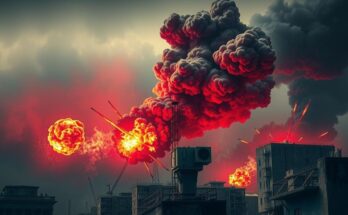M23 rebels in eastern Congo have declared a unilateral ceasefire following severe clashes that resulted in at least 900 deaths. The ceasefire aims to facilitate humanitarian aid amidst ongoing unrest in the mineral-rich region, with declarations of no intention to seize further territory at present. International calls for negotiation and assistance underscore the urgent need for a resolution to the conflict, which has displaced many civilians.
The Rwanda-backed M23 rebels, who have captured Goma, a pivotal city in eastern Congo, have announced a unilateral ceasefire commencing Tuesday to permit humanitarian relief amidst escalating violence. The announcement followed grave reports from the U.N. indicating at least 900 fatalities due to recent confrontations between the rebels and Congolese military forces, which left many civilians displaced and seeking refuge.
Despite seizing control of Goma, which is strategically located in a mineral-rich region, the M23 faction has stated they have no intentions of advancing towards Bukavu or other areas. Rebel spokesman Lawrence Kanyuka emphasized the aim of protecting civilians while revealing that the group is not seeking further territorial gains at this time, despite previous aspirations.
This ceasefire declaration aligns with the convening of a summit by regional leaders advocating for peace, with President William Ruto of Kenya noting the participation of Rwanda’s and Congo’s heads of state. The G7 foreign ministers also urged all conflict parties to engage in negotiations and facilitate unobstructed humanitarian assistance to affected civilians, reiterating the importance of conflict resolution through dialogue.
The M23 rebels, numbering approximately 4,000 and backed by Rwanda, are currently one of the most formidable armed groups in eastern Congo, a region rife with competing militias amid an ongoing ethnic conflict. Their involvement raises concerns as the fighting forces numerous internally displaced persons to flee towards Rwanda, exacerbating the humanitarian crisis.
In the midst of the turmoil, heart-wrenching accounts from families illustrate the devastating impact of violence, including tragic losses as individuals frantically search for the deceased. The emotional scars of conflict are echoed in the stories shared by grieving family members, highlighting the urgent need for a resolution to restore peace in the region.
The current conflict in eastern Congo is deeply rooted in a series of inter-ethnic tensions exacerbated by historical grievances stemming from the Rwandan genocide of 1994. The M23 rebel group claims to protect ethnic Tutsis in Congo, and their actions are understood in the light of long-standing hostilities involving Hutu and Tutsi factions. This situation has intensified violence in a region already plagued by instability, resulting in significant humanitarian challenges as displaced populations seek safety and assistance amid the conflict.
The unilateral ceasefire announced by the M23 rebels is a crucial step aimed at alleviating the suffering of civilians in eastern Congo. As the international community calls for peace talks, the need for humanitarian aid and safety for displaced individuals remains paramount. This complex conflict, underscored by historical ethnic strife, demands an urgent and comprehensive resolution to ensure lasting peace and stability in the region.
Original Source: apnews.com




